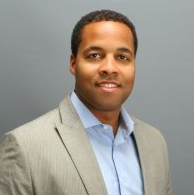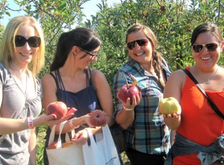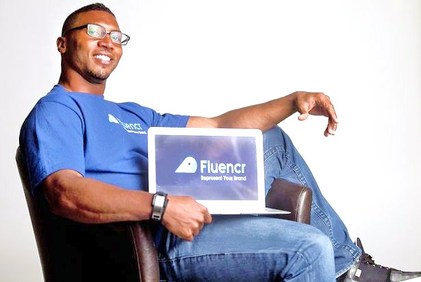Better Weekdays
Upon graduating from Columbia, Chris began his career as a trader at Goldman Sachs. After a few years, he switched gears and joined 1888 Mills, a global home and commercial textile manufacturer. While at 1888 Mills, Chris served as Director of Global Strategy Sustainability and later became Executive Vice President, all while picking up an MBA from Northwestern’s Kellogg School of Management.
Frustrated with the inefficiencies he saw plaguing the job search process, Chris pitched an idea to solve the issue at Chicago’s 2011 Startup Weekend. The idea captivated fellow attendee Kunal Parbadia, and a few months later the two co-founded Better Weekdays.
Touting itself as the GPS for Your Career Journey, Better Weekdays helps students and professionals navigate the tricky and frustrating job search process by matching their values with career opportunities. JobScript, an online self-assessment and development tool created by the team at Better Weekdays helps you recognize your unique strengths and provides clarity and targeted professional development to the job search process.
Job seekers utilize comprehensive and validated feedback provided by JobScript, enabling them to develop a plan for their professional life. Better Weekday users then go on a private job-matching platform providing opportunities aligned with their preferences and job compatibility.
Targeting students and alumni from top universities, Better Weekday’s currently offers it’s assessment for free to students from schools such as Northwestern, Michigan, and Notre Dame. You can watch Chris discuss Better Weekdays during a recent Technori Pitch event here. To learn more about Chris and Better Weekdays, check out my interview with him below and check out their website betterweekdays.com
 Founder & CEO Chris Motley
Founder & CEO Chris Motley There are three big insights that validate what we are doing: 1) By the time one is 30, they will have had 4 different jobs - and there needs to be a platform to facilitate these inevitable transitions, 2) universities are not necessarily funded to provide career services to alumni, thereby fueling the current staffing/recruiting model and 3) companies that traditionally recruit college graduates don't have access and visibility to certain campuses/alumni pools to objectively select quality talent in a cost effective way. Better Weekdays seeks to be the GPS for one's career journey - a private platform to help individuals actively manage their careers. This enables us to provide our corporate customers with "best fit" candidates at half the cost of traditional sources.
Q: What made you decide that culture fit is the most important determinant of success for a “better weekday”?
We didn't decide culture fit is important - the market did - and as a result, it is a key component of our job matching process. In established organizations, people tend to outgrow their jobs (in startups, it is the opposite). Specifically, the rate at which employees acquire skills is much faster than the time it takes for their roles to change - leading to unhappiness and attrition. If someone is a good fit - defined by their motivations, abilities and personality being aligned to their job and work environment - they will be happier and tend to stay longer. With the cost of replacing an employee at 1.5x the salary, its easy to recognize the value an extra year can contribute to the bottom line.
Q: Why the decision to initially focus on recent grads/alumni from top 50 universities?
We no longer limit ourselves to top universities. Originally, it was a function of focus and recognizing that the path to get more universities on board is least resistant when you have top universities on board. Also, we wanted to leverage the admission standards of selective schools to entice companies to be interested in our value proposition.
Q: What makes JobScript better than your average Meyers Briggs Test that most students take to find out what occupation would fit their personality?
JobScript is a career assessment that takes the most holistic perspective of an individual in the context of finding meaningful work. Other tools, including MBTI, were not specifically designed for this purpose. It is also important to note that JobScript is only part of the "career DNA" that we capture from an individual. We also capture their preferences and work experience, which, provides a very holistic picture of a candidate before the 1st interview.
Q: Since your company is focused on recruiting and hiring, what matters most to you as a founder and CEO when it comes to finding new employees? It is crucial that someone has the motivations, abilities, and personality for the job that they have to do at Better Weekdays. We eat our own dog food - every current/potential employee goes through JobScript as part of the screening process.
Q: If you could only ask a potential hire one or two questions, what would they be? 1) What have you built and why (if they have not built anything - why did you make the choices you made thus far in your career journey)? and 2) Can you explain something to me that you know VERY well (ideally it should be related to the job they applied for)?
Q: Better Weekdays puts a good amount of focus on the idea of personality types and characteristic, what is the most important characteristic when it comes to being an entrepreneur?
A key framework that underlies our technology is Career Archetypes. There are 9. For example, Artistic Creativity, Human Development, and Process Efficiency. These archetypes are the manifested by the combination of one's Motivations, Abilities and Personality (MAP) and we measure the dominant archetypes in every individual. For an entrepreneur, my view is that Entrepreneurial Challenge, Motivational Energy and Strategic Decisions matter most. I hope that I'm right, because those are my 3 dominant archetypes!















 RSS Feed
RSS Feed
